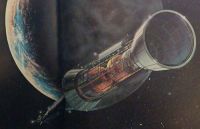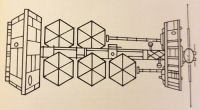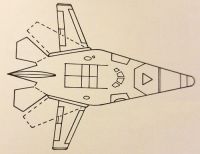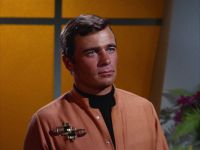2040s (FASA)
From Trekipedia
Reference Stardate 0/4001 through 0/4912
2040
- RSD 0/4000: Commercial interplanetary travel begins with the inaugural flight of Solar Spacelines.[1]
- RSD 0/4000: The Columbus class, boasting an advanced fusion drive, enters service as Earth's largest space-going vessels. With a crew of 40, the U.N.S.S. Icarus is one of the more notable ships of the class.[1]
- RSD 0/4000: The Magellan class space liner, with a capacity of 260 passengers and an advanced fission drive, enters service. The U.N.S.S. Prince of Wales, launched this year and commanded by Captain Lars Olmstead, is a notable example of the class, and remains in service for more than three decades.[1]
2041
- RSD 0/4100: The Adameve leaves for Barnard's Star. This first interstellar journey is expected to last nine years.[1]
2042
- RSD 0/4200: The Parr class interplanetary tug, with a complement of 18, enters service.[1]
- RSD 0/4202.25 (25 February): The Columbus class U.N.S.S. Icarus—an 8,600-ton craft powered by a high-acceleration, sub-light Bussard ramjet, and a crew of 40, commanded by Captain Roger Tauber—departs on the first manned expedition to Alpha Centauri, the nearest star system to Earth, to search for a habitable planet. A crowd of several thousand people watch nearby as the ship is launched from the moon, while billions watch live, televised coverage. The estimated travel time for the voyage is six years.[1][2][3]
2043
- RSD 0/4300: Extra-solar activity grows as more crews will soon be needed for interstellar flight.[1]
2044
- RSD 0/4400: The Interplanetary Communications Network guarantees reliable communications throughout the Solar system.[1]
2045
- RSD 0/4500: The Andorian Empire is at its height, with 13 colonized worlds outside the Andor system.[4]
- RSD 0/4501: The United Nations celebrates 100 years of cooperation among the peoples of Earth.[1][4]
2046
- RSD 0/4600: The Venus Flyer, a variable-wing aircraft with a crew complement of 6, passes its final Earth testing and is transported to Venus to take part in the Venus Terraforming Project.[1]
2047
- RSD 0/4700: After 20 years, the Venus Terraforming Project has progressed enough to allow a base to be constructed at the north pole. Estimates indicate it will be a few more decades before the work is completed.[1]
2048
- RSD 0/4806.23 (23 June): The U.N.S.S. Icarus arrives at Alpha Centauri. Contact is established with a humanoid culture there, despite many scientific predictions doubting the possibility of intelligent, humanoid life elsewhere in the universe.[1][2][3]
- RSD 0/4812 (December): Centauran scientist Zefram Cochrane formulates the initial warp drive calculations, making faster-than-light travel possible and, eventually, practical.[1][2]
2049
- RSD 0/4900: Solar system activity booms as new industrial methods continually raise the Gross Solar Product (GSP).[1]
- RSD 0/4900: The Montecello class cargo carrier, with a crew of 15, enters service.[1]
References
- ↑ 1.00 1.01 1.02 1.03 1.04 1.05 1.06 1.07 1.08 1.09 1.10 1.11 1.12 1.13 1.14 Goldstein, Stan and Goldstein, Fred with Sternbach, Rick. Star Trek: Spaceflight Chronology. Pocket Books, 1980.
- ↑ 2.0 2.1 2.2 Wheeler, Wm. John with McLimore, Guy W. Jr., Poehlein, Greg K., and Tepool, David F. "Cadet's Orientation Sourcebook." Star Trek: The Role Playing Game, Book 2004A. FASA Corporation, 1983.
- ↑ 3.0 3.1 Theisen, John A.. "The Romulan War." Star Trek: The Role Playing Game, Supplement 2221A. FASA Corporation. 1986.
- ↑ 4.0 4.1 Menke, Bernard Edward and Stuart, Rick David. "The Federation." Star Trek: The Role Playing Game, Supplement 2011. FASA Corporation. 1986.




